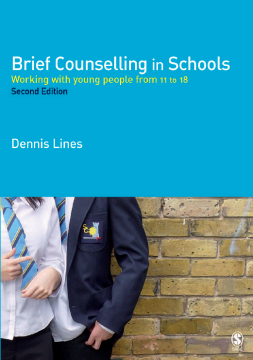
Additional Information
Book Details
Abstract
Brief Counseling in Schools, Second Edition is a practical guide to providing help and support to young people experiencing a range of difficulties in their home and school lives. Recognizing the constraints of working within school settings, the book illustrates how counseling can nevertheless be effective, even when time is short and confidentiality is hard to preserve. Based on a method of brief integrative counseling that can be adapted to the range of problems which pupils bring to counseling, and illustrated with rich and varied case material, the chapters look at issues of: self-esteem; depression and suicidal thoughts; bullying; parental separation and step-parent conflict; loss and bereavement; spiritual concerns; smoking, drug, and alcohol use; and sexuality.
`If we want to go beyond Asbos, truancy patrols and sin-bins then we need to give our young people not just hugs but skilled counselling by people who know what they're doing. In the school environment, where time is short and confidentiality is difficult to maintain, that's not easy, but Brief Counselling in Schools describes ways of doing it' - Times Educational Supplement
'The book is informative, well referenced and researched. The book comes to life where there are extracts, illustrations and anecdotal stories from the author's work with children. In this practical context, there seems to be real meaning to the tips and techniques that he offers, and this provides an interesting framework for his own views and stands on issues in practice. The new chapter on anger, aggression and violence included illustrations and case examples and was an insightful, lively and moving read. The themes raised are pertinent and I think of interest to all practitioners working with adolescents, and possibly also to those working with parents of adolescents' - Therapy Today
'The society we've put together isn't kind to adolescents. An increasing number of them are mentally ill, and an increasing number of adults are simply frightened of young people. If we want to go beyond Asbos, truancy patrols and sin-bins then we need to give our young people not just hugs but skilled counselling by people who know what they're doing. In the school environment, where time is short and confidentiality is difficult to maintain, that's not easy, but Brief Counselling describes ways of doing it… Its worth is borne out by the fact that this is a Second Edition, with much new material dealing with the latest legislation on child protection' - Times Educational Supplement
Praise for the First Edition:
`Brief Counselling in Schools is an invitation to the school or student counsellor from any discipline to think about their practice. It is a book to be read and for me, it was time well-spent' - Young Minds Magazine
`The book advocates an approach to counselling which is highly appropriate for schools and colleges. It should be a core text for courses promoting counselling skills in teachers' - Ron Best, University of Surrey Roehampton
`Dennis Lines does not avoid addressing the thorny problems of 'limitations' which can face school counsellors, particularly if they are working peripatetically. The chapter on adolescence is comprehensive, and considers the interplay between physical, emotional and cognitive influences at this stage of young people's development, and the overall impact of puberty. Contrasting therapeutic orientations are described with particular consideration given to how they each best fit into the school system' - BACP North London Magazine
Table of Contents
| Section Title | Page | Action | Price |
|---|---|---|---|
| 1. The challenges of cross-cultural training and how to respond | |||
| 2. Understanding other cultures | |||
| 3. Making your training work | |||
| 4. Practical techniques for training cross-culturally | |||
| 5. Planning and delivering cross-cultural online training | |||
| 6. Cross-cultural financial training | |||
| 7. Training in specific countries (Bangladesh; Cambodia; Ethiopia; Ghana; India; Jordan; Kenya; Pakistan; UK; Zambia) | |||
| 8. Examples of cross-cultural training | |||
| 9. Training cross-culturally - frequently asked questions | |||
| 10. Toolkits (Introductory activities; Energizing activities; Concluding activities) | |||
| 11. Published and online resources |
